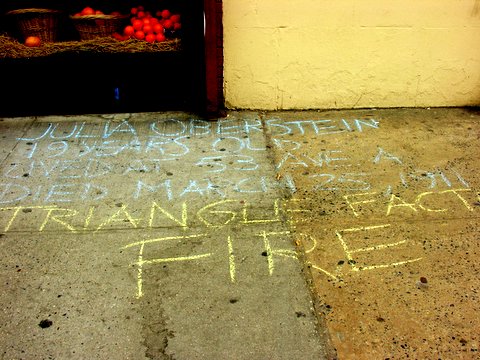Previously the workers at the Triangle Shirtwaist Factory, a sweatshop located on Washington Place, had tried to organize the shop and improve the working conditions. The owners of the shop, Isaac Harris and Max Blanck, vigorously opposed all effort at organization, even resorting to hiring men to physically beat the picketers. Eventually they grudgingly agreed to some concessions, but insisted on locking the doors during working hours to prevent the seamstresses from sneaking out early or stealing.
A fire started on the 8th floor. Fed by scraps of fabric, nurtured in the dusty, wooden, cramped surroundings, it spread extremely rapidly.
 |
| The top three floors of the Asch Building--the fire is alongside Greene Street. |
Workers frantically tried to escape the fire. Some tried the rear fire escape--which quickly buckled under their combined weight and peeled away from the building, dropping them to their deaths. Some tried the elevator--which was only able to make a couple of trips before the cables started melting. Some even jumped down the shaft after the elevator. Some were able to run down one of the two staircases, but access to the other one was impossible--because the doors were locked. And the foreman who had the key had already escaped.
The foreman with the key had already escaped--and left them locked up on the 9th floor.
The fire engines arrived immediately, but could do little because their hoses and ladders only reached up to the 6th floor. The fire had attracted many observers--including a young Frances Perkins--but no one could help. All they could do was bear witness. All they could do was watch as doomed workers appeared framed in the windows, the flames behind them, and made the only choice they had left--how they were going to die.
Assistant cashier: [I see] my girls, my pretty ones, going down through the air. They hit the sidewalk spread out and still.
Reporter: The last workers were trapped against the blackened windows, burning to death before our very eyes. The glass they were pressed against shattered. Down came the bodies in a shower -- burning, smoking, flaming bodies, with disheveled hair trailing upward.
It all happened so quickly--less than an hour from start to finish. All those young girls falling from above. All those families they never had--those husbands they never married, those children they didn't bear. Those stories never told. All those bodies lying on the wet ground, their faces turned to the evening sky.
Imagine having to identify your sister. Your wife. Your uncle.
It was Mama's hair. I braided it for her. I know...I know.
Blanck and Harris, of course, denieddenieddenied. They denied that they knew about the locked doors, they denied negligence, they denied all responsibility for the massacre whatsoever. They were indicted, tried, and by smearing the testimony of one of the survivors because of her lack of fluency in English, and attacking another's truthfulness, were eventually found not guilty--legally. The court of public opinion, as they say, was another matter entirely.
 |
| Blanck and Harris, and most other industrialists, protested the cost of the workplace reforms in the wake of the disaster. But they didn't need to worry--they actually turned a profit on the fire, since they overclaimed damages and their insurance company was bullied into giving in. They were overpaid about $400 per body. As a final act of despicability, Blanck was found guilty two years later of locking the door in another factory during working hours. |
There are a couple of different conventional memorials to the Triangle victims--statues and headstone and so forth--but I rather like the poetic simplicity of this one:
וְאֵלֶּה, שְׁמוֹת בְּנֵי יִשְׂרָאֵל, הַבָּאִים,
These are the names...


No comments:
Post a Comment